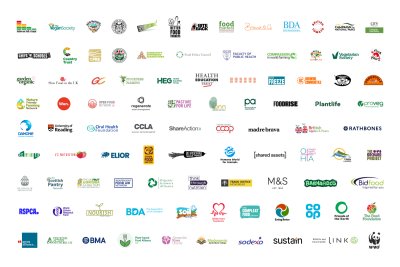Leaving the EU poses significant risks for UK environmental and wildlife policy and our commitments to reduce greenhouse gas emissions, but it also provides an unprecedented opportunity to revitalise our countryside in a way that better meets the needs of people and the environment, for generations to come.
This is the chance to create new and ambitious policies that are fair to farmers and taxpayers, and provide real value for money.
A rich natural environment, with a hospitable climate, clean air and water, healthy soil, thriving wildlife and vibrant green spaces, underpins the well-being and prosperity of our society. Nature brings joy and wonder to millions of people. Yet, current environmental protections are not working as effectively as they could. Additional measures are required if we are to not only halt the damage and decline, but also to restore the UK’s degraded environment and biodiversity.
The Sustain alliance is working with the Greener UK and Wildlife & Countryside Link networks of environment, wildlife and climate change specialists, to champion coherent and well-supported policies that aim to secure the much-promised ‘Green Brexit’. We support:
- Food and farming policies that provide healthy food grown to high standards of environmental protection, with farming providing good jobs and livelihoods, supported by a fair supply chain; with farming and land management playing their part in reducing the greenhouse gas emissions that cause dangerous climate change.
- A robust and visionary Agriculture Bill that prioritises:
- Public health - support for farming methods that promote public health, such as low antibiotic and pesticide use, and promotion of healthy fruit and vegetable production. Read our public health amendment briefing and recent blog.
- Agro-ecology - support for whole-farm systems, such as organic, that can deliver on multiple environmental, social and animal welfare benefits. Read our agro-ecology amendment briefing and blog.
- Fair dealing - support for powers, duties and regulation to ensure fair trading practices throughout the food supply chain, to protect decent livelihoods. Read our fair dealing amendment briefing.
- Agricultural workers - support for reinstatement of an Agricultural Wages Board for England, to ensure better pay and conditions for farm workers. Read our 2 page briefing on the amendment we want and longer agricultural workers briefing.
- International trade - support for an amendment to ensure that imports of agri-food products must meet the same high standards expected of British farmers, to prevent unfair competition. We are joining with others to call for this and a budget amendment. Read a short joint briefing on these issues.
- Development of a new environmental watchdog that would hold government and industry to account for their policies and practices that affect our shared environment.
- Defence of important environmental principles via the EU Withdrawal Bill.
- Red lines for UK trade deals for food, farming and fishing that would enhance rather than undermine the UK’s efforts to promote sustainable farming, a cleaner environment and better public health.
- An ambitious 25-Year Environment Plan with specific commitments and targets, as well as introduction of a new Environment Act.
The principles that our colleagues and Sustain are championing for better UK environmental policy are:
- A shared countryside: We all have a stake in our countryside. We need an open and inclusive debate about its future to develop policies that reflect society’s shared needs.
- Nature everywhere: We need a healthy, thriving natural environment across the whole of the countryside, not just in protected areas. Public policy is integral to efforts to halt declines in wildlife and the wider environment, and should drive restoration at a landscape scale.
- For future generations: Policies must ensure that our countryside is managed in a way that addresses the challenges of the future, particularly climate change, so that each generation leaves the environment in a better state than they found it.
- Value for money: Taxpayers’ money should be invested in public benefits that the market does not provide, including healthy soils, abundant wildlife, better animal welfare and beautiful places for people to enjoy. In the long term, the market needs to better complement public funding, making it profitable and rewarding to manage land sustainably for both private and public benefit.
- Unacceptable to harm nature: We need a strong legislative baseline to safeguard the natural environment, and protect the interests of society. These simple rules should apply everywhere irrespective of payments, with properly resourced and effective enforcement.
- Easy to help nature: Simple systems for accessing the right financial support, underpinned by trusted advice, will make it easier for farmers, foresters and land managers to restore and integrate the environment into their businesses. Rewards should be related to outcomes: those that deliver greater public benefit should receive greater public support.
- Fair to farmers: The government should ensure farmers receive a fair share of the profit generated in the supply chain, creating more resilient farm businesses. We must all contribute toward greater public understanding of where food comes from, and how it is produced.
- Built on strong evidence and past success: Future policies should build on successful agri-environment schemes, drawing on evidence and experience of how to reverse declines in nature, and secure ecosystem services vital to farming and wider society. A well-resourced programme of research and monitoring will facilitate continuous improvement.
- Coherent with other policy areas: There must be clear and coherent objectives, targets and milestones that are much better aligned with other areas of policy such as trade, food procurement, public health, heritage, tourism and climate change.
- The right action at the right scale: By using data to understand the environmental, social and cultural value of different places, we can ensure action is targeted in the right way. Coherent action at landscape-scale, for instance a catchment-based approach, would make sure policy was relevant to local needs and contributed towards regional and national environmental objectives.
The environmental principles are an extract from the Greener UK briefing: Agriculture at a crossroads: the need for sustainable farming and land-use policies
See also Wildlife & Countryside Link’s briefing: A future sustainable farming and land management policy for England
Sustain is also working with specialist groups to address climate change, and the greenhouse gas emissions associated with food and farming, most notably:
- The Eating Better Alliance, helping people move towards eating less and better meat and more food that’s better for us and the planet. Sustain sits on the board of this independent alliance.
- Working with the Groceries Code Action Network to champion extension of the Groceries Code Adjudicator to protect farmers. Among many other benefits, this could help reduce large amounts of good food going to waste on farms, helping more of this good food to be eaten, hence reducing greenhouse gas emissions.
- Supporting the work of the new Sustainable Soils Alliance, working to reverse the soils crisis for food security, climate mitigation and flood prevention.
Credit: Kristine Tanne / Unsplash
Climate Change and Nature: Sustain has taken a keen interest in the rapidly accumulating evidence about the effect of food and farming on climate change and nature, as scientific evidence emerges that our food system is a very significant contributor to greenhouse gas emissions and biodiversity loss.



